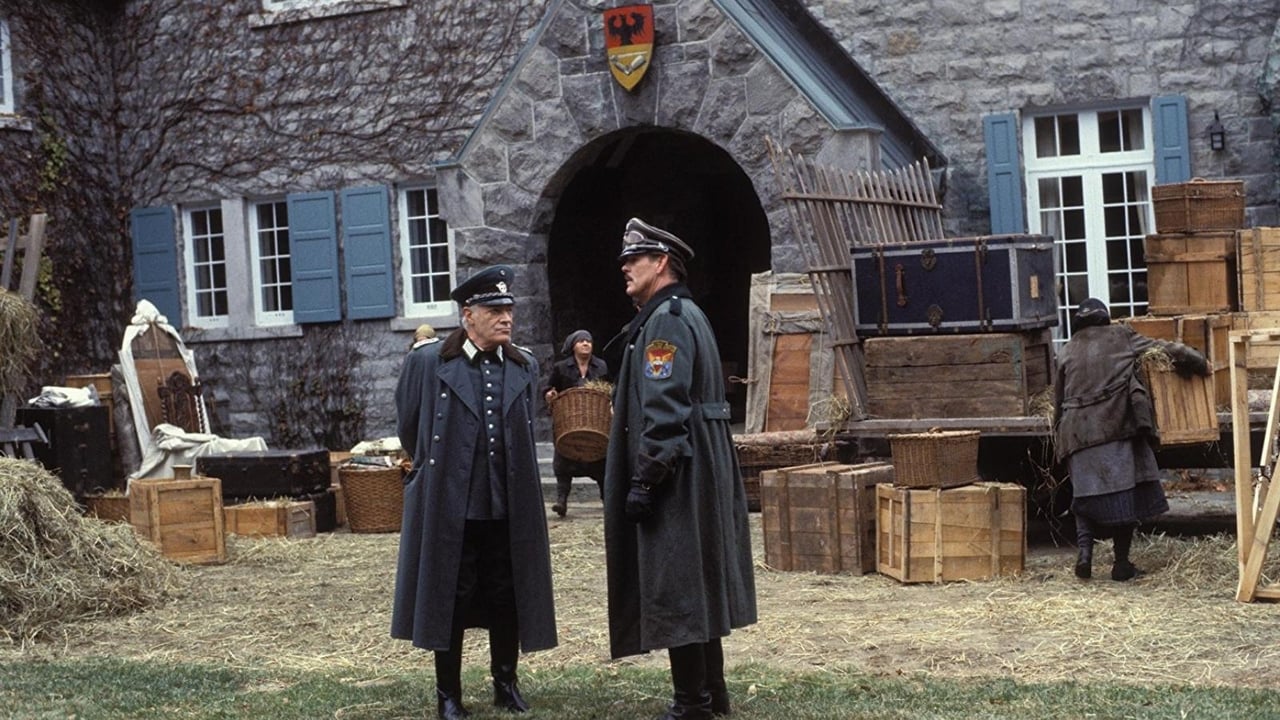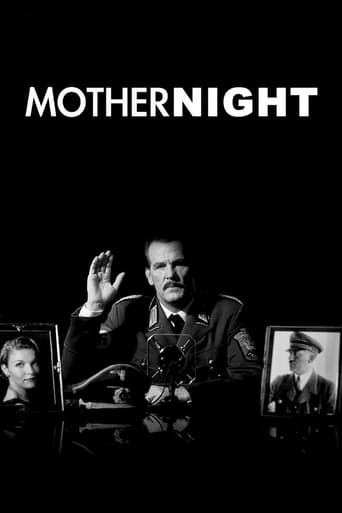



What makes it different from others?
Instant Favorite.
Disturbing yet enthralling
This movie tries so hard to be funny, yet it falls flat every time. Just another example of recycled ideas repackaged with women in an attempt to appeal to a certain audience.
View MoreGiven the track-record for adaptations of Vonnegut novels, I was pleasantly surprised at how faithful this film is to the original source material (with one glaring and near-fatal exception near the end). It is also handsomely-made and features fine performances from everyone involved, especially Nick Nolte. The problem is that the tone is all wrong. The power of Vonnegut's novel is its black humor, which is completely lacking here; in the novel, Howard W. Campbell's story, despite being rooted in WWII and the Holocaust, is a farce that ultimately brims over with moral outrage; here is it more of a arty tragedy.
View MoreWhile always a fan of Nick Nolte's, I have been frustrated at times by his choice of roles. However, in his portrayal of Howard W. Campbell, Jr., Mr. Nolte has achieved, perhaps, his finest hour. This adaptation of Kurt Vonnegut's brilliant novel shines the light upon an age-old question: just how responsible for their actions are those who are "only following orders?" I believe Vonnegut supplies the answer in this story. If you're looking for a movie to really sink your teeth into, this is the one. At the time I saw it, I had remarked to my wife that I was tired of the garbage coming out of Hollywood; I'm glad I salvaged this one off the top of the pile - it deserved rescuing.
View MoreI am a huge fan of Vonnegut's work and I'm very fond of this movie, but I wouldn't say that this is a film of the "Mother Night" that I read. When people say that Vonnegut is unfilmable, two things come to my mind. One is that many of his themes are very near the knuckle or even taboo, despite the accusation sometimes used against him that he chooses relatively "easy" targets for his satire. This means less every day that passes as far as filmability is concerned. Directors these days appear to revel in breaking taboos and I have high hopes for the version of "Bluebeard" now in production. Amazing to think that an innocent piece like Vonnegut's "Sirens of Titan" would probably have been the equivalent of "R" rated if filmed when it was published back in the 50s, for its violence, language and sexual and thematic content, though it's a tragedy that nobody's come up yet with a filmable script for it. And in the present economic climate, I also hope some director out there is looking closely at "Jailbird", "Galapagos" and "Hocus Pocus".The other thing is his narrative style, heaping irony upon irony upon irony but still making it hilariously funny. It seems impossible to objectify, and that appears to be the biggest obstacle to making great films of his great novels, because the little authorial comments that colour our response as readers are just not possible in movies without resorting to too often clumsy techniques like "talkovers". Vonnegut suggested that there was a character missing from filmed versions of his work, himself as author/narrator. To its credit, "Breakfast of Champions" (the movie) tried to keep the comedy and came a bit of a cropper for its pains. As did another turkey made from a Vonnegut novel, "Slapstick" in an even more spectacular way.Still, there's nothing wrong with a director giving us his subjective interpretation of Vonnegut, and "Mother Night" is an excellent example of how, as another reviewer put it, a good director can add a visual poetry to a source like this. But so much of the humour is lost that though it's the same plot, it's not really from the same novel I read. If it had been, I'd probably have been rolling in the aisles laughing a few times watching it. For a reader of the novel, I think a chuckle even at the end is forgivable. The end of the film, however, is truly poignant, and I think one of the film's successes is that it can genuinely leave you feeling that you've watched someone walk a razor's edge between good and evil, and the jury is still out.Standing alone and of itself it's well worth a look. Technically there are some minor but glaring errors, notably in continuity, and it too often looks drab and theatrical, but most of the time it hits an acceptable note and occasionally shows considerable imagination and resourcefulness. The acting in general is of a high order, even if maybe the dialogue is by today's standards a little stilted.It survives quite well watching back to back with "Slaughterhouse-5", and there is actually quite a bit more "good" filmed Vonnegut out there, mostly versions of his short stories - "Harrison Bergeron", "Who Am I This Time?" and some other things like, of course, the misfiring filmed version of his very funny but disposable play, "Happy Birthday Wanda June". Also there was an interesting piece , if it still exists, done in the 70s called "Between Time And Timbuktu" which Vonnegut apparently didn't like much, although he was involved in its production, because he felt it misinterpreted him in its generality. He said it reminded him of the bizarre surgical experiments performed in the HG Wells tale "The Island of Dr. Moreau", but it did for many people serve as an excellent introduction to his work.But if the films don't make you want to go to the superior source material, they're not doing their job.As the man said, more or less, the big show is inside your head.
View MoreAmerican playwright Howard W. Campbell, Jr. (played with a musty obsolescence by Nick Nolte) lives happily in Germany with his actress wife, Helga Noth (Sheryl Lee) before the beginning of World War II. At the peak of his life, Howard is drafted by an American agent (John Goodman) to become a spy on behalf of the Allies; forewarned of the risks the job holds, Howard has everything to lose, but finds the offer irresistible. Following the death of his wife and the end of the war, Campbell camouflages himself with the anonymity of a solitary life in New York City, which muddies his neuroses even further. The central question (indeed, a question that has frustrated many critics) of the movie and Kurt Vonnegut's source novel is, "is Campbell a hero or a traitor?" Director Keith Gordon and screenwriter Robert B. Weide offer us clues, but no answer, and this ambiguitythis NOT knowingis what keeps "Mother Night" fresh and interesting throughout. At the beginning of the film, Nolte portrays Campbell as intelligent and confident; by the end, he's either scared and uncertain, or scared and COMPLETELY certain of his contribution/debt to humanity for the role he played in the war. Gordon applies a certain icy sheen to the images of the film's first half, which complement his portrait of the Nazi bourgeoisie and captures Vonnegut's dramatic side. On the flip side, when Campbell is confined to his lonely New York apartment (which he affectionately calls "purgatory") only to be discovered by a group of Nazis, the humor produced also is purely distinctive of the author, and provides a temporary respite from the dramatic tension that unfolds. The moral (even spiritual) paradox "Mother Night" presents doesn't lend itself to simple resolution, and to a degree, should be left ambiguousthe black-and-white scenes of Campbell staring wearily into space as he is imprisoned in Israel suggest an unspoken contemplation we are not made privy toas Campbell is a character whose inner workings we wind up knowing very little about; the war changes him, coming back to America changes him, and meeting up with the Nazis in New York compels him to prolong the facade of his "act" even further, to the point where he can only stare wearily at an image of himself projected on a wall, spewing anti-Semitic bile. Perhaps that's the best reaction we could hope for.
View More